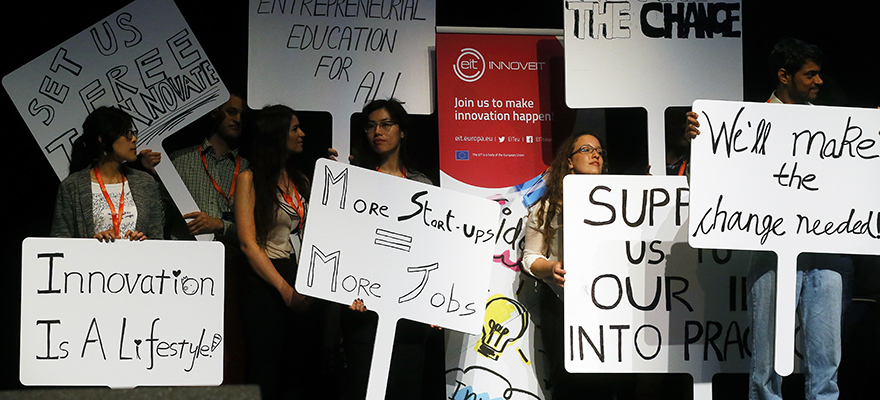Entrepreneurial skillset needs to be integrated into European education

Calls for the EIT entrepreneurial education to be spread across Europe at #InnovEIT Forum 2015
Europe’s traditional model of education needs a fresh approach if it is to be competitive and meet the demands of an innovative society; attendees concluded at InnovEIT 2015, Europe’s multidisciplinary innovation forum that took place in Budapest from 05-07 May. Europe also needs to establish stronger cross-border ecosystems to support innovation.
Organised by the European Institute of Innovation and Technology (EIT), the Forum brought together more than 600 entrepreneurs, researchers, policy makers, business leaders and students to explore the wide-range of topics surrounding creating a more effective and dynamic environment for innovation in Europe. The next EIT Forum will take place in June 2016.
To answer European needs for entrepreneurial education and stronger innovation, the EIT is expanding its activities through the EIT Regional Innovation Scheme (EIT RIS) – a structured outreach scheme to increase the innovation capacity in regions in Europe not directly benefiting from the EIT and its KICs. In 2016, the EIT will also establish two new Knowledge and Innovation Communities (KICs).
“Innovative education plays a crucial role in restoring economic growth. Investment in education is really an investment in tomorrow”, said Tibor Navracsics, European Commissioner for Education, Culture, Youth and Sport. “The EIT offers a unique education model that is focused on the development of entrepreneurship and innovation skills, helping to boost innovation in Europe and create new, high quality jobs. This is how the EIT can contribute to achieving this European Commission’s top political priority of restoring growth and getting people back into work,” added the Commissioner. “The greatest elements of innovation were born in Europe – leading universities, entrepreneurship that drives growth. Europe has an enormous diversity potential which needs to be capitalised upon”, said Peter Olesen, Chairman of the EIT Governing Board. Currently Europe lags behind the US, Japan and South Korea on innovation. “We need a supportive environment, market stability, flexible regulations; but most of all we need the autonomy and a change of mindset of the individual”, added Olesen.
Europe needs to establish a cross-border eco-system to support innovation if it is to flourish and bring a change, the Forum concluded. Entrepreneurs and innovators need support, coaching and mentoring, and the EIT Knowledge and Innovation Communities (KICs) are shaping the path.
Through its five KICs (Knowledge and Innovation Communities), the EIT provides leadership and funding for its ‘EIT label’ courses that cherish the spirit of entrepreneurship and aim to change mindsets when it comes to innovation in Europe. These progammes have entrepreneurship skills embedded into the curricula; tailored towards the needs of European innovation system, Europe’s job market and society.
The output is change leaders of tomorrow; entrepreneurs that are ready for the challenge of bringing their idea to a modern marketplace. For innovation to boost, we need innovators. Govinda Upadhyay, winner of the EIT CHANGE Awards 2015 and a graduate from EIT’s KIC InnoEnergy SELECT Master programme, is a great example. “What’s really different about our solution is that we teach our customers how to build it themselves customised to their own needs”, said Govinda about his LEDSafari Lamp.
"We need a culture which supports risk taking”, said Corinne Vigreux, Co-Founder of TomTom at the conference. “Europe is too risk averse. If our education system teaches us that failure is bad, then we are afraid to take risks. If you do not take risks, you will never succeed in creating something that lasts”, added Vigreux.
Hosted by higher education institutes and selected for their excellence, the EIT-labelled degrees now boast over 472 graduates (to reach more than 1000 by end 2015), an alumni network that is now a significant factor in the development of entrepreneurship across Europe. By integrating all sides of the so called “knowledge triangle”, business, education and research, the EIT KIC model has already yielded significant achievements including the creation of 141 startups (to reach 205 by end 2015) and 120 new products and services (to reach 280 by end 2015).
Download the full Press Release below!


 Share this page
Share this page


